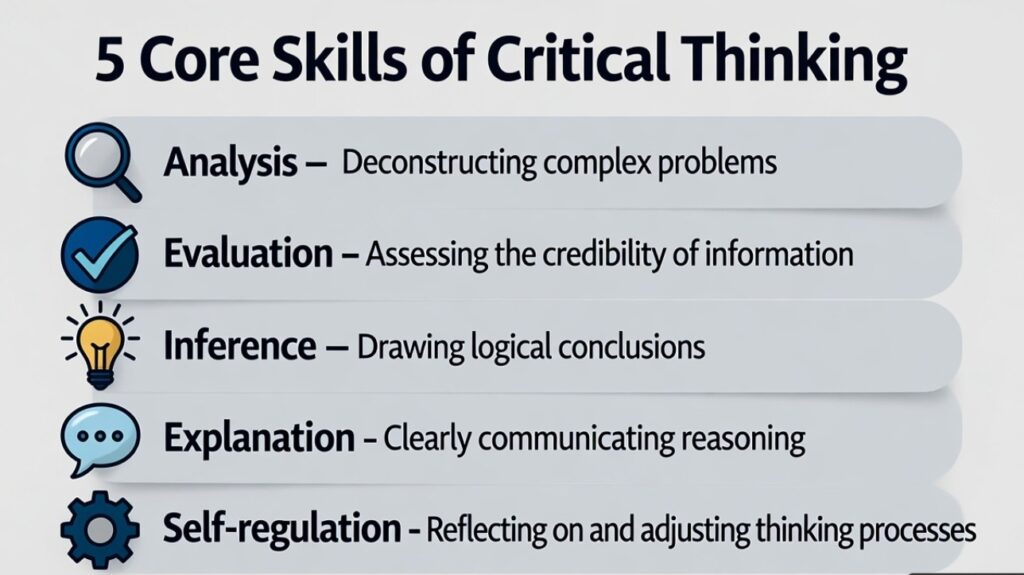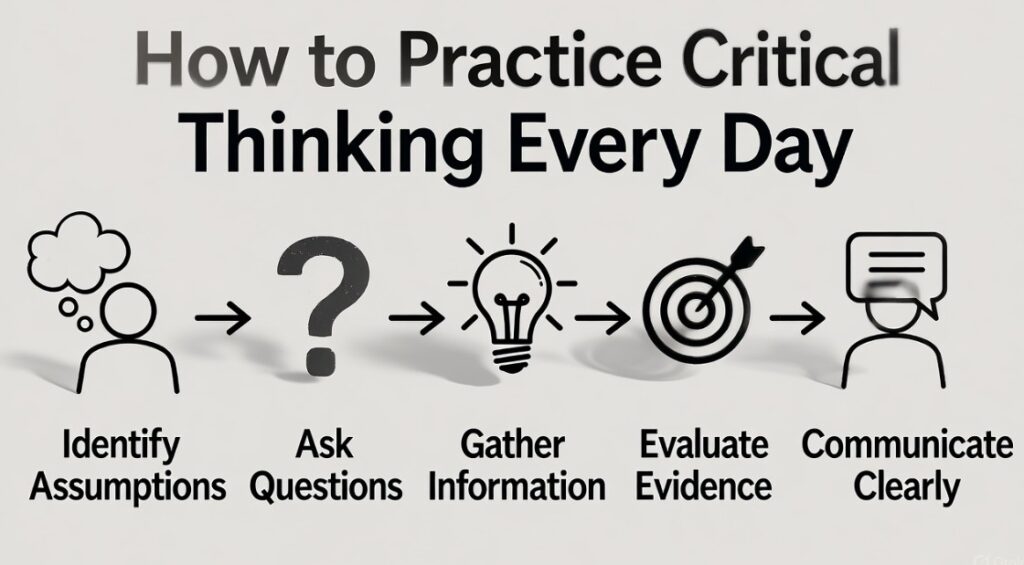
Critical Thinking Exercises: Boosting Skills for Adults and Businessesv
Table of Contents
We have to make decisions every day about what to believe, how to react, and which way to go. Without the right mindset, it’s easy to feel lost or overwhelmed. That’s where critical thinking exercises can help. These are real tools that help us think critically, ask the right questions, and make smart choices. Critical thinking activities for adults help you make better choices and build the self-confidence that leads to personal and professional success.
What Are Exercises For Critical Thinking?

Critical thinking is about slowing down and looking at things from more than one point of view. Critical thinking exercises are just structured ways to practice that habit. These activities learn us to think about the facts before we act instead of jumping to conclusions.
For adults, especially in a world of deadlines, responsibilities, and constant news feeds, this type of mental conditioning is priceless.
Core Skills Involved
The real power of these exercises lies in problem-solving, reasoning, and evaluation. Consider a manager deciding between two proposals for a project or a parent working out how to create fair rules in the home. Both demand good judgment, tolerance, and the ability to anticipate consequences. This is where analytical thinking is a trusted ally. It turns messy, complex problems into manageable decisions.
Why Adults Need These Exercises
Life constantly asks us to choose: which job to take, how to manage money, when to say yes or no. Without a framework, decisions can feel random or reactive. Practicing critical thinking helps develop stronger decision-making strategies, making us more confident. Moreover, much like games to improve working memory, it keeps our brains flexible and ready to adapt. In brief, these exercises aren’t about theory. They’re about living with more clarity.
Critical Thinking Activities for Adults

The most effective method of sharpening the mind is practice, and critical thinking activities for adults are crafted with that in mind. They provide the space to question, analyze, and crystallize ideas in personal and professional life. What’s effective about these exercises is how versatile they are; whether practiced individually or in a group, they generate lifelong skills.
Group-Based Activities
Debates, case study discussions, and role-playing are among the finest critical thinking exercises for social contexts. They encourage participants to argue for perspectives, consider counterarguments, and think on their feet as new information becomes available.
In a workplace training session, for example, a group might be put in a real-life situation (like a big drop in sales) and have to come up with ways to fix it. One group might want to change the prices, while another might want to start a new campaign. Participants learn to question beliefs and improve their thinking by looking at things from both points of view.
These tasks help people work together and interact better at work. They teach you to be flexible and care about others.
Individual Challenges
Individual activities are equally important. Writing in a journal and doing thoughtful research force us to be honest about the choices we make. Logic problems, on the other hand, help us stay on task and get smarter. Different parts of the brain are used in these kinds of tasks, which may improve cognitive flexibility and even mental health.
Like memory games or memory training software that help you remember things, these kinds of activities maintain brain connections alive and flexible. The result? Better judgment, better memory, and the courage to deal with problems.
Business Critical Thinking Exercises
There is no place for speculation or old habits in today’s competitive world. Critical thinking exercises for business help leaders and workers figure out how to deal with tough challenges, examine their assumptions, and come up with better plans. These activities help you make better decisions and come up with new ideas at work. They help businesses remain flexible, strong, and ahead of the game. It also sparks workplace innovation.
Applications for the Workplace
What matters most are practical ways. Brainstorming, when centered on open-ended inquiries, fosters inventive cognition and creative reasoning rather than conventional thought processes.
Decision-making simulations, in which teams must respond to situations such as an unexpected market change or supply chain disruption, allow professionals to practice the assessment of risks and consideration of options before taking action. Such exercises enhance team collaboration so that solutions are comprehensive and sustainable.
Advantages of Practicing Critical Thinking Exercises
Consider two workers who must make a tough choice: to invest or not in new software. One, without the sharpened critical thinking ability, might decide on the price tag alone and make a hasty decision. The other, who practices regular exercises, will ponder long-term savings, worker efficiency, and potential pitfalls. The difference is stark—one risks inefficiency, and the other makes a decision that benefits the entire company. Over time, the habit of critical thinking transforms workplaces into hotbeds of smarter decision-making, stronger leadership, and more profound innovation.
Conclusion
Critical thinking is not just doing puzzles. It’s seeing the world more clearly and making smarter decisions every day. The more you practice, the easier it is to spot opportunities, weigh risks, and act with confidence. Whether at work or in life, exercising your mind this way turns challenges into opportunities and keeps your brain sharp along the way.